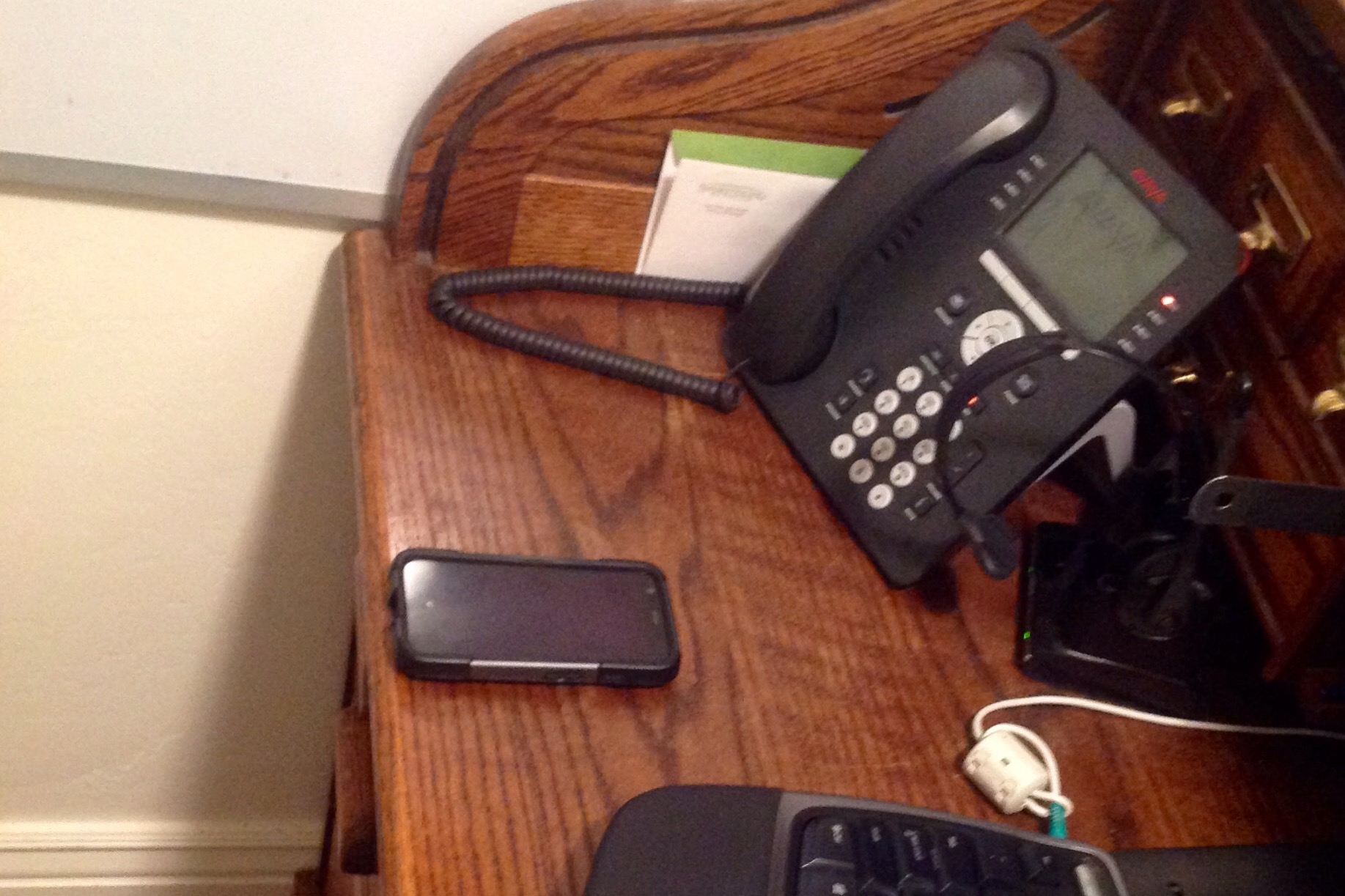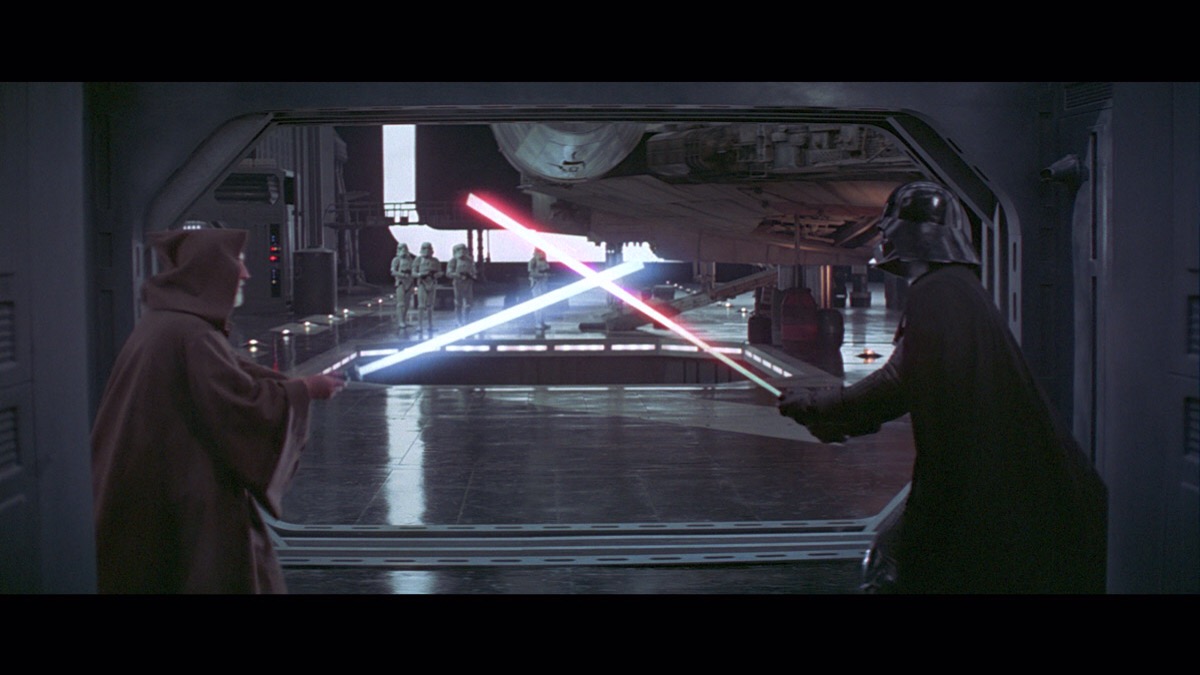There’s a truth about all jobs. You have meetings. You can’t stop them, you can only hope to contain them. My new company does meetings like no company I’ve ever seen, or heard actually. The meeting made me hear double.
I’ve run hundreds, possibly thousands of meetings. There are serveral aspects of a successful meeting that you can preplan for.
Have a Purpose
Some people will say you shouldn’t have reoccuring meetings, since you can be more effective if you only schedule a meeting for a specific objective. Those people get it almost right. A reoccuring meeting is fine, if it has a purpose. I have regular status meetings with my virtual teams. We go over objectives, resolve issues and plan future work. Sometimes the purpose is to check the status and then end.
Keep Them Short
I rarely schedule an hour-long meeting. If we cannot resolve it, whatever “it” is, in 30 minutes or less, then we either need to learn more about the issue, or schedule two meetings. No one is paying attention in the second half. It is perfectly acceptable to have a brief call and then say, “Okay, no more questions? Good. See you next week.” I have one coworker who will say, “I’ll give you back 17 minuts of your day.”
Make Sure You Can Hear
Bet you didn’t know this was even an issue, huh? It is in my company. I used to sit next to Matt and Craig. We were three of the four corners of a cube farm.
I was new and I was scheduled to take over the project that they were working on. We needed to get together and go over the project plan. I started to get up
Rodney, where are you going?
We have our project meeting now, right?
Yeah.
Aren’t we going to meet in the conference room?
Why?
Ah. . .
No, we did the conference call, and many more after that from our desks. This might be a good plan if we each had our own office, or at least were not within speaking distance of each other. I could literally reach out and touch Craig and Matt and yet we were using Lync to hold a conference call.
The issue was that I could hear Matt and Craig talk. And then a half second later, it game through the phone.
So, let’s get…so…started..lets…Matt…get…do…started…you…Matt…have…do…the…you…notes…have…from…the…last…notes…time?…from last time?
I put my hand over my ears to cut down on the crosstalk. Matt and Craig seemed oblivious to the weird echo. And it’s not like the conference room was on another floor, or something. It was literally 20 feet away. That’s the nature of working for a telecommunication company. We have phones and, dog gone it, we are GOING to use them!
Rodney M Bliss is an author, columnist and IT Consultant. His blog updates every weekday at 7:00 AM Mountain Time. He lives in Pleasant Grove, UT with his lovely wife, thirteen children and grandchildren.
Follow him on
Twitter (@rodneymbliss)
Facebook (www.facebook.com/rbliss)
LinkedIn (www.LinkedIn.com/in/rbliss)
or email him at rbliss at msn dot com(c) 2015 Rodney M Bliss, all rights reserved
I was starting to get annoyed at the automated voice on my phone.
Before you can make a call, you must first make a payment.
I had set up automatic payments on my Cricket cell phone account months ago. It was annoying that they broke it. It didn’t help that I was right in the middle of trying to make a call when the system informed me I couldn’t.
I work with computers, but it doesn’t mean I enjoy talking to them. I especially dislike automated phone systems. After a couple of false starts I eventually managed to navigate my way through the myriad of options and make a $100 payment.
FINALLY!
Before you can make a call, you must first make a payment. . .your current balance is $100.
Huh?

The Hillerich & Bradsby Company was recently sold to a Japanese sporting goods company. Don’t feel bad if you don’t recognize the name Hillerich & Bradsby. I’m a huge baseball fan, and I still have to look up the name every time. Hillerich & Bradsby is better known as the company that makes Louisville Slugger baseball bats.

I’ve toured their Louisville Kentucky factory a couple of times. (That’s a Really Big Bat.) The company was owned by the same family for over a hundred years. Why they were sold is a strange tale. They lost a multimillion dollar lawsuit. That in itself isn’t a surprise. Companies are sued on a regular basis. Hillerich & Bradsby was sued because a young man was hit in the head by a line drive off a Louisville Slugger bat. It’s a tragedy for him and his family, and I don’t want to diminish that.
But, the logic of the lawsuit was doesn’t make sense to me. The lawyers argued that the ball travelled too fast; that the bat essentially worked too well.
Can something work too well? Can it be too efficient?
The lawyers arguing against Hillerich & Brasby thought so.
I called back into the Cricket support number. Cricket is a part of AT&T. Both use the same network to route calls. A Cricket phone is a lot cheaper than an AT&T phone. That $100 I pay each month covers four separate phones. One of the ways Cricket saves money is they automate their support line.
It was me versus the Interactive Voice Response (IVR.)
If you get caught in IVR hell, hears a tip:
Just say no.
Nancy Reagan had it right back in the 1980’s when she told people to just say no.
Welcome to Cricket support. Please type or say your ten digit phone number.
No.
I’m sorry, I didn’t catch that. Please type or say your ten digit phone number.
No.
I still didn’t get that. Please type or say your ten digit phone number.
No.
Okay. I’m having trouble hearing you. Please wait while I transfer you to a customer service representative.
It wasn’t over that quickly, of course, but eventually I managed to talk to an agent. She explained that my phone privileges had been suspended because I had violated the terms of the User Agreement.
How?
I talked too long. Cricket’s User Agreement (you know, that long boring text that you skip and click AGREE on) limits phone calls to 100 minutes or less. I had unlimited talk and text, but if I talked more than 100 minutes on a single call, Cricket decided I was using the phone as a monitoring device, or for some other automated process that was in violation of the rules that I agreed to without reading.
They don’t have a process that kicks in at the 101st minute, but if they saw a particularly long call, they would suspend the account. My problem call? 546 minutes, nine hours on a single call. That was a really bad day. Our system broke and stayed broken not just for nine hours, but for multiple days.
She finally got my service turned back on. I explained that their IVR was wrong about why my account was suspended. She said she’d report it. I have my doubts.
The phone is designed to let me talk, but use it too much and it’s a problem. I’ve now changed the way I use my phone. I stil lhave really long conference calls, but after about an hour and a half, I excuse myself, hang up and call right back in.
It’s less efficient, but sometimes being too efficient is a bad thing.
Rodney M Bliss is an author, columnist and IT Consultant. His blog updates every weekday at 7:00 AM Mountain Time. He lives in Pleasant Grove, UT with his lovely wife, thirteen children and grandchildren.
Follow him on
Twitter (@rodneymbliss)
Facebook (www.facebook.com/rbliss)
LinkedIn (www.LinkedIn.com/in/rbliss)
or email him at rbliss at msn dot com(c) 2015 Rodney M Bliss, all rights reserved
You have two ears and one mouth so you should listen twice as much as you talk.
We’ve all heard it, right? Probably from your mother or father. Maybe from a spouse or a girlfriend. You have two ears, so you can listen twice as much.
It’s not true.
In my job I play a telephone, or a parrot, depending on your perspective. Here’s how a typical service outage will develop.
- Something in our system breaks. It might be a failed DNS server so our network requests can’t resolve, or a peripheral gateway might failover and interrupt our existing connections.
- Regardless of the issue, when it breaks, our Mission Control folks call me. They con’t call an on-call number. They don’t call a group of people. They call Rodney Bliss’ personal cell phone.
- I gather information from them like how many agents are impacted? Which of the three sites are affected? What error message shows up? When did it start?
- Then, the Mission Control folks call our Service Desk and start a conference call bridge to start gathering the right people to fix the problem.
- While they are doing that, I call our client and report the issue to them and find out if they can offer any insight.
I’m literally the Man-in-the-middle. Here’s where the process starts to fly in the face of the “two ears” idea.
I join our internal conference call and I continue calling and talking to our client. I have two phones at my desk; a cell phone and a desk phone. Even at home, I have a work phone. Typically I have the headset on my left ear and the earbud in my right ear.
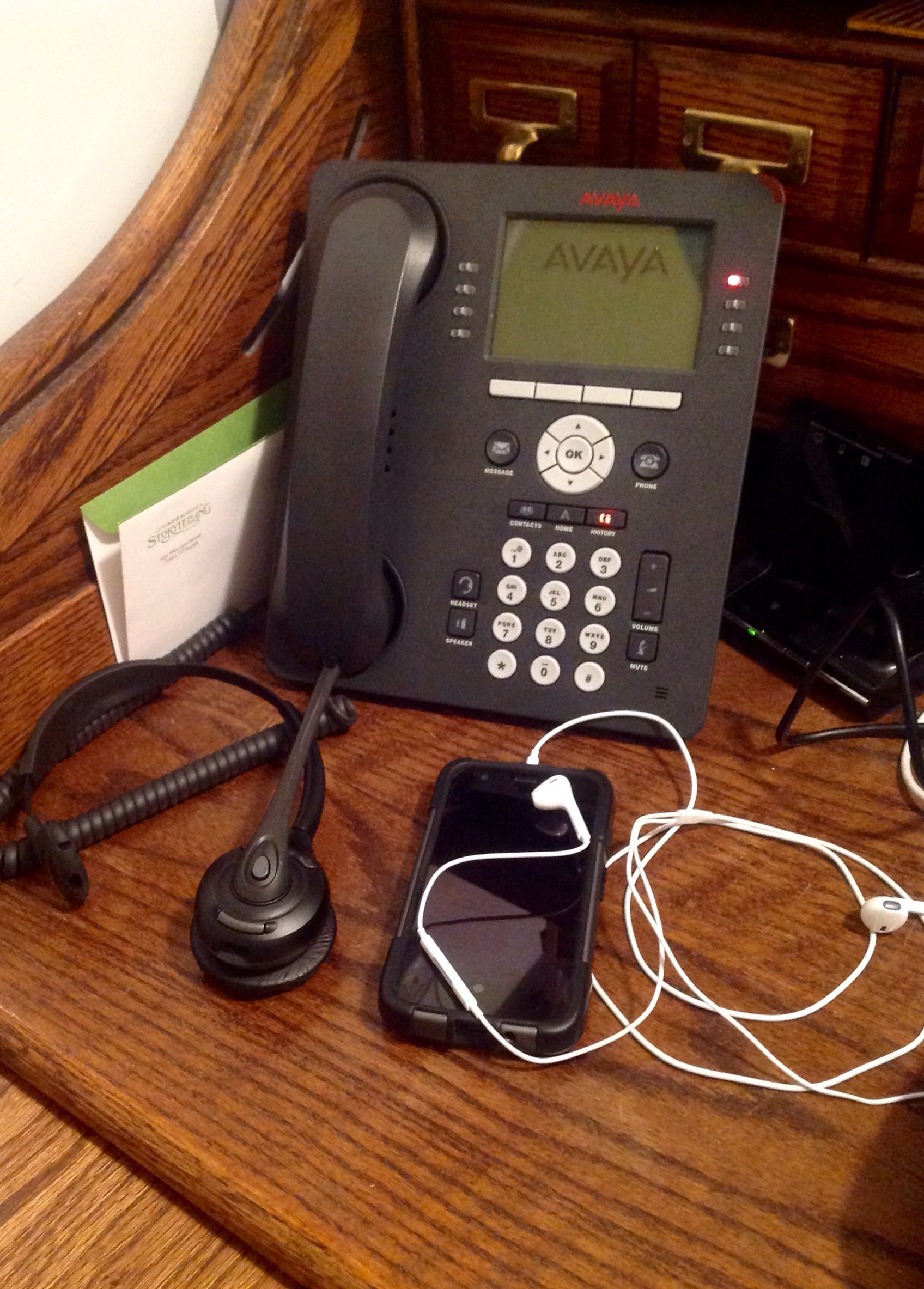
Fortunately both have a mute button. Here’s how a typical conversation might go:
CLIENT: Are the agents on the Security Compliance line-of-business also seeing an error?
ME: Let me check<Mute client line>
<Unmute internal line>ME: Are the Security Compliance agents seeing an error?
MISSION CONTROL: We’ll check. . .<Radio conversation with the floor>
… Yes, they are getting a file not found error when they click the Azure tool.
ME: Okay, I’ll be right back.<Mute internal line>
<Unmute client line>ME: Yes, the Security team is getting an error in the Azure tool.
CLIENT: Okay, have them try using the Amarillo tool instead and see if that makes a difference.
ME: Okay, just a sec.<Mute client line>
<Unmute internal line>ME: Have the secuirty team try using the Amarillo tool instead.
MC: Okay. Hang on. . .<Radio conversation with the floor>
. . .that seems to resolve it, but now they can’t see the client address information.
ME: Okay. I’ll be back.<Mute internal line>
<Unmute client line>
And so it goes. Sometimes for hours. My longest call was over 500 minutes long. Yes, eight hours on a single call. But, here’s where the advice my mother gave me fails. Most of the time, I can manage the two phones just fine. But, at times both groups start talking to me at the same time. I can generally keep it straight unless I’m actually speaking, but I can’t talk to both at the same time. I really need to be able to talk to two people at the same time.
And then there are the days we have multiple outages. Typically, two phones work fine, but one particularly bad day, I had two outages running at the same time.
- Desk Phone: Internal bridge for issue #1
- Cell Phone: Client bridge for issue #1
- Business Skype account on my PC: Internal bridge for issue #2
- Personal Skype account on my iPad: Client bridge for issue #2
I was making it work, and all from my home office.

And then the client announced:
Rodney, this isn’t going to work.
What do you mean?
I mean we can’t run outage bridges for both issues at the same time.
Why not?
My team can’t work two issues at once.
Seriously? Probably because they only have one mouth and two ears
Rodney M Bliss is an author, columnist and IT Consultant. His blog updates every weekday at 7:00 AM Mountain Time. He lives in Pleasant Grove, UT with his lovely wife, thirteen children and grandchildren.
Follow him on
Twitter (@rodneymbliss)
Facebook (www.facebook.com/rbliss)
LinkedIn (www.LinkedIn.com/in/rbliss)
or email him at rbliss at msn dot com(c) 2015 Rodney M Bliss, all rights reserved
I didn’t notice. I use a messanger bag to carry my stuff back and forth to work.

(Yes, it’s really a “man purse,” but I would never mention that!)
Today it was too ight and I never even noticed. I picked it up, headed to my car and started my 45 minute drive to work. I drive alone. Yes, that bugs me too. I work in a building with 800 people, most of whom do shift work. Why Utah Transit Authority doesn’t have a bus stop closer than half a mile is beyond me. At least I swapped out my Suburban for Iron Man and doubled my gas milage.

The coloring bears a striking resemblance to a certain super hero costume.
One of the consequences of driving alone is that you have lots of time to think. My thoughts can drift all over. I thought about what I did yesterday. I thought about the camping trip I have next week. I thought about the morning meeting I have coming up today. I thought about how I accidently killed my son’s hermit crab. I thought about . . .OH NO!
My bag sits right behind my seat so it’s in easy reach, even if I can’t see it. I reached back and searched the inside of my bag with one hand while trying not swerve too badly. Interestingly I felt the need to turn off the radio to complete my search. Nope. It’s not there. Well, that sucks!
I’ve forgotten my laptop.
I have a home office set up with dual monitors and a docking station. It mirrors my work setup, except that at home the monitors are 19″ and at work they are 23″. And my laptop is right now safely tucked into the docking station on my desk.
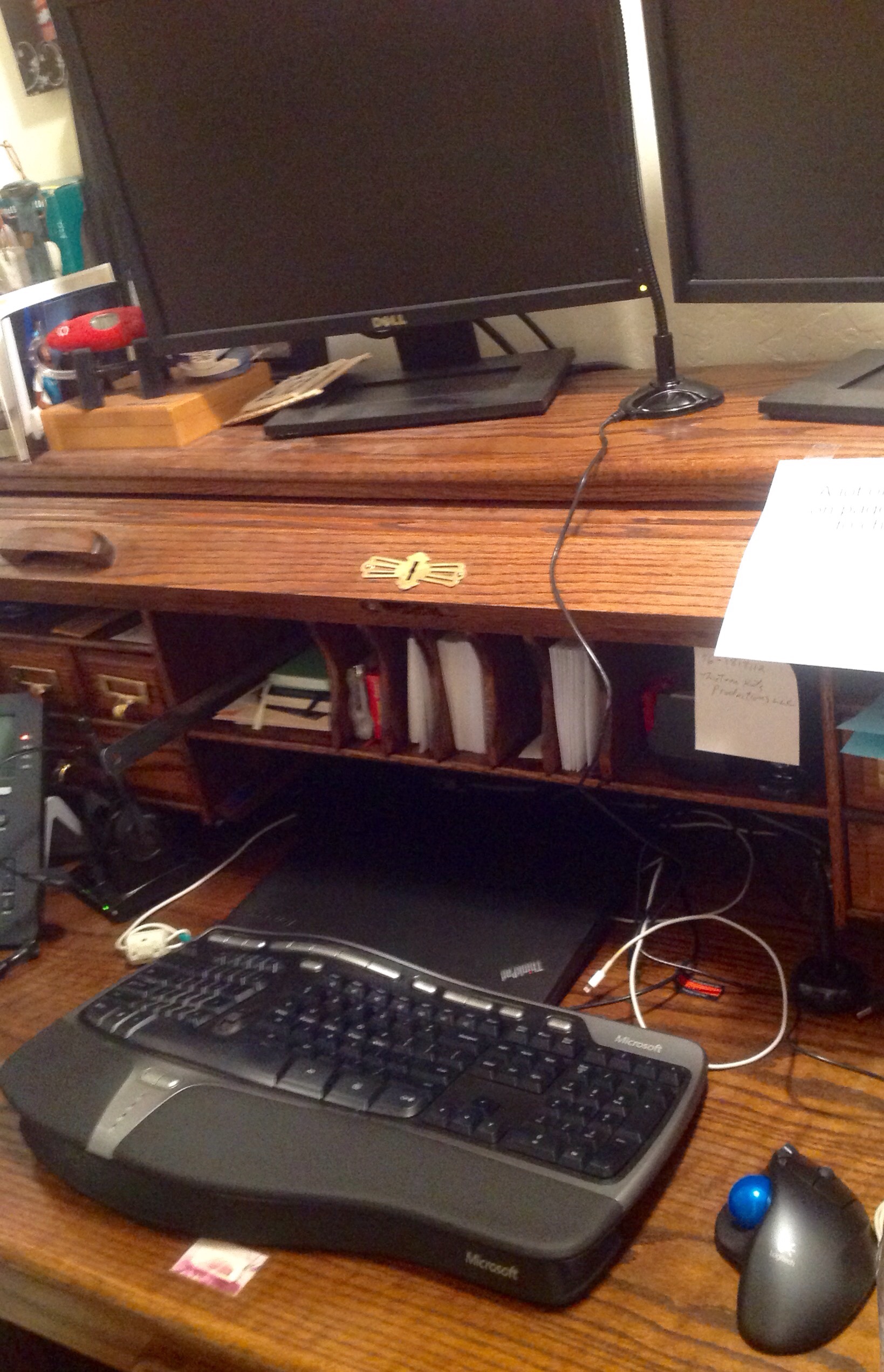
A glance at the clock tells me that I’m about 30 minutes into my commute. Turning around means 30 minutes home, then 45 minutes back to work. And I normally leave early enough to beat the worst of the traffic. An hour delay is going to place me smack in the middle of morning traffic. Call it more like a two hour delay.
What would you do?
In my case, I considered the question,
What do I really need my laptop for?
Email? Nope. My phone (an Android Moto) has full email access, although typing is a pain.
Calendar? Nope. I never take my laptop to meetings. I use my iPad.
Documents? Nope. Everything important is on a SharePoint server.
I think I’m okay. I turn the radio back on and continue on to work. I did briefly think, “Why do I even have a laptop?” Plenty of reasons, but, of course, for a single day, I could do without it. I also started thinking, suppose it had been reversed? Suppose that instead of my laptop, I had forgotten my phone? What would I do?
What do I really need my phone for?
Receiving phone calls? Yeah. I have a desk phone, but after three rings it forwards to my cell. My desk phone doesn’t even have voicemail.
Making phone calls? Yup. I don’t know anyone’s phone number any more. It’s all in the contacts list on my phone. Normally, I make calls on my desk phone by first looking up the number on my cell phone.
Email? Yeah. I spend a lot of time away from my desk. If we have an service outage, I need the details right away. The email to my phone tells me that.
Calendar? Oh yeah. I have few enough meeting that they are an exception. My phone warns me 15 minutes before the meeting starts. And most of my meetings are online. I need to login from my phone.
If it was my phone, I realized I would need to turn around and blow the two hours to retrieve it.
Wait! I didn’t. . .
Whew. My phone is there. I’m fine.
Rodney Bliss is an author, blogger, columnist and IT Consultant. His blog updates every weekday at 7:00 AM Mountain Time. He lives in Pleasant Grove, UT with his lovely wife, thirteen children and grandchildren.
Follow him on
Twitter (@rodneymbliss)
Facebook (www.facebook.com/rbliss)
LinkedIn (www.LinkedIn.com/in/rbliss)
or email him at rbliss at msn dot com(c) 2015 Rodney M Bliss, all rights reserved
Even in the best of mentoring relationships, eventually the mentee grows up. As a mentor, it’s important to allow those you are mentoring to grow. It’s part of the reason I enjoy working with interns. The relationship is set up to be temporary.
Craig was the best intern I ever worked with. We called him Craig The Awesom Intern. I think we even set his email Display Name to show that. Craig was someone who made his own luck. He was a student at Brigham Young University and the CIO for our non profit spoke to a computer science class that Craig was taking. Afterward, Craig approached the CIO.
I’d like to go to work for your company.
Oh?
How to I go about applying for an internship?
The CIO took his name and sent it to his VPs. The VPs send it to the directors. The directors sent it to the service managers. My service manager sent it to me.
This guy hit up the CIO at BYU. Do you want him as an intern?
He didn’t have to ask twice. In addition to being bold, Craig was brilliant. He automated several of our processes. He helped design some of our systems. We got to talking one time about his role, and specifically how it related to me, his manager.
Yeah, I was telling my roommate about you.
Oh?
Yeah, I said you were an old guy who told lots of stories.
Ouch. the generation gap just slammed shut on my ego.
As Craig The Awesome Intern considered his career path, I sat down and talked to him. He had an opportunity to go to work for a local startup that would also allow him to finish school.
You’re doing a great job here, Craig. I could not be happier.
Well, that’s good.
But, you have to leave.
Huh?
Look, I’ve been in this industry a long time. I’ve worked for Microsoft for nearly a decade, I’ve worked for small companies, and other big ones. You have the potential to have a fantastic career. But, you’re going to change jobs a lot. It’s the nature of the industry. Your time at this non-profit is will not impress future hiring managers looking at your resume.
How do you mean?
I mean that someone looking at this position is going to assume it’s not as technical as it could be. Take the startup job. You’re at the point of your career that you need to work for a company that will build yoru resume.
Craig ended up leaving his intership early to take the startup job. As much as I would have loved to keep Craig as an intern and later to hire hiim as an employee, I would have been doing him a disservice.
Make sure your teaching your mentees to recognize opportunities and take advantage of them when they come along.
Marcus was one of my engineers at this same nonprofit. Marcus was very smart, but he lacked a couple key attributes that he needed to be promoted. And he really wanted to be promoted. Marcus and I worked on it for a year. I helped Marcus identify strategic people to find an opportunity to work with. I helped him improve his presentation skills. (Not the least of which was to turn email spellcheck on.) At the end of a year, Marcus was promoted to Senior Engineer. I don’t know who was happier, him or me.
Things change. Marcus left the non profit to go to work for a large investment bank. About six months later I got a LinkedIn notification that Marcus had been promoted to VP at the bank. My friends in finance tell me that everyone at a bank gets to be a VP. Well, in IT, very few people get to be a VP.
I had to consider how I felt about Marcus’ promotion. Ask me if I want to be a VP?
and yet, I had worked very hard with Macus to help him learn the skills needed to succeed. It was amazing to see how quickly it paid off for him.
If you are going to be mentoring someone, it helps to have an exit strategy. And it helps to consider how you will feel if that person eventually gets promoted faster than you do. Trust me, it’s not a feeling you want to try to deal with on the fly. Better to think it through first.
Finally, a word of caution. I’ve seen some executives who choose to mentor someone for what it does for the mentor. They might tend to want to hold on to the mentee as long as possible. Remember the scene in Miracle on 34th Street when Kris Kringle confronts the “psychiatrist” Mr Sawyer, about asking how he’s affecting young Alfred?

Sawyer was claiming to help Alfred, but really it was about maintaining control. He never intended for Alfred to be “cured.” He couldn’t let go.
Remember that an important part of mentoring is helping people to be successful and in some cases move on. Don’t be afraid of it. It’s the best part of what we do.
Rodney M Bliss is an author, acolumnist and IT Consultant. His blog updates every weekday at 7:00 AM Mountain Time. He lives in Pleasant Grove, UT with his lovely wife, thirteen children and grandchildren.
Follow him on
Twitter (@rodneymbliss)
Facebook (www.facebook.com/rbliss)
LinkedIn (www.LinkedIn.com/in/rbliss)
or email him at rbliss at msn dot com
(c) 2015 Rodney M Bliss, all rights reserved
Are you new here?
Yeah, I just started last week.
My name’s Sal, I’m the Director of Support.
My name’s Rodney. I came here from WordPerfect.
Oh, you’re the one.
This was the start of many conversations that Sal and I would have over the years. This conversation started in an elevator and before we reached the lobby Sam had invited me to a soccer game.
Here’s a bit of career advice. If you are new in a company and a senior executive invites you to go to a sporting event. . .say yes. Sal asked me a lot about WordPerfect. But he also told me a lot about Microsoft. He was a mentor.
I have no idea why he offered to help me advance my career. Probably because he’s just a really nice guy. I went to him one day as I was preparing to travel to Bogata Colombia for the first time. At the time, the rebels held more than half the country, they financed their rebellion partly by capturing American businessmen and holding them for ransom.
Sal had travelled to Colombia a few months earlier.
So, we’re you nervous while in Colombia.
a little. They announced that I was coming to speak at a group in the city. I told my security detail that I didn’t want them to tell me what security measures they put in place.
You ou didn’t want to know?
No. I assumed they were good at their jobs. Knowing the various threats they were prepared for would only make me more nervous.
I didn’t have a security detail. I had a driver who didn’t speak English and my Spanish was horrible. But, they also didn’t advertise my coming.
Hey, Sal, you know that the U.S. Government won’t negotiate with terrorists. If I get captured will Microsoft pay my ransom?
. . .Don’t get captured.
Sal is now an Angel investor. We still keep in contact, and he still offers me advice. . .although nothing as valuable as “Don’t get captured.”
Kent is a VP where I work. He’s over the client that I work with. We joined the company around the same time. Several times he’s helped steer me through some of the intricacies of our corporate culture. Several months ago we were launching a new line of business. As the time for our first call approached, we realized that our system was not configured correctly. That’s my job to notice.
I started working the phones and emails. We had sixty agents waiting on me. I went into what I call “tank driving” mode. I figured out the shortest path to getting the system fixed and then I pushed hard for it. In the process I ruffled some feathers. Some of the ruffled feathers emailed my manager. To his credit, he realized the importance of getting the launch going and understood my actions.
But I was talking the experience with Kent and one of our directors.
Should I have pulled back some?
No. If it happens again, do the same thing. Kent and I will back you.
Sometimes it really is who you know. Mentors can make all the difference.
Rodney M Bliss is an author, columnist and IT Consultant. His blog updates every weekday at 7:00 AM Mountain Time. He lives in Pleasant Grove, UT with his lovely wife, thirteen children and grandchildren.
Follow him on
Twitter (@rodneymbliss)
Facebook (www.facebook.com/rbliss)
LinkedIn (www.LinkedIn.com/in/rbliss)
or email him at rbliss at msn dot com(c) 2015 Rodney M Bliss, all rights reserved
Give a man a fish and you feed him for a day.
Teach a man to fish and ou feed him for a lifetime.
– 12th Century Spanish philosopher Maimonidas
I love fishing. My dad taught me that any time spent fishing doesn’t count against your alloted time in life.

But, I don’t think Maimonidas was talking about fish.
Business requires all of us to both cooperate and compete constantly. I’m in competition with my competitors, of course. But, as a project manager, I’m in competition with my other PMs. There are never enough engineering resources to fully support all the projects that IT dreams up. It’s not unusual for PMs to loan resources like you might loan a tool.
Russell, I need Jet on my call at 2:00 tomorrow, but he’s already committed to be on your call. Can I have him for that hour?
Okay, but only this week. I’ll need Telecom resources starting next week.
Agreed.
Today, I want to talk abot the other side of competition.
Have you ever had someone take an interest in you or your career? Someone like a senior manager? Someone who wasn’t in your chain of command, they just wanted to share some of their experience?
I’ve worked for companies that had formal mentor programs and I’ve worked for many more that didn’t. Microsoft had a formal mentoring program. Applicants were matched with mentors who would meet with us once a week or so and help us by answering questions, or sharing ideas.
It was a less than fulfilling experience, and I’m not sure why. I don’t even remember my mentor. I do remember that I was in the middle of the mentoring program when my manager’s manager decided to fire me. My mentor didn’t do much to help me foresee or head off that unpleasant event.
I think the problem was that the mentor/mentee relationship was forced. I think to be truly effective, a mentor relationship has to be somewhat selfish on the part of both the mentor and the mentee. The mentor has to care about the person they are mentoring. It takes time and energy to mentor someone. If you don’t have, or develop a personal friendship with the person you are working with, it becomes an hour long classroom lecture.
The mentee needs to be selfish too. They are want to see their career advance. They want to get a better review. They want to know how to climb the corprorate ladder from someone who’s already been there. But, like any dynamic relationship there needs to be a give and take. The mentee is going to bring youth and enthusiasm to the relationship. They also may bring contacts in other departments.
Microsoft insisted that mentors/mentees not come from the same teams, or even departments. Everyone involves get some cross pollination. And while you may like your boss, and she might be a fantastic resource, she will be a terrible mentor. . .for you. A manager needs to be able to hold you accountable for tasks and reprimand you if they don’t get accomplished in a timely manner.
That action is completely at odds with the mentor role. The mentor is designed to help you learn from mistakes and figure out what happened and how to keep it from happening again. You want a mentor who is 100% on your side. A manager, by her very nature, cannot be that person.
A mentor can even be from a different company. Of course, it can’t be someoen from a direct competitor, but the IT world changes so often, that it’s very likely you will have contacts at multiple companies. A mentor at another company can be a great asset. Of course, you will have to be more careful in what you share. Mentor relationships should never trump company confidentiality.
Mentors can help you in multiple ways. They can help you to
- Learn vital industry skills
- Introduce you to industry leaders and collegues
- Offer advice on problems
- Provide direction on career choices
- Simply be someone to ask questions of
Metors can be a great asset to you and your career. However, you have to ask. A formal mentor/mentee relatioship doesn’t happen by accident. You need to pursue it as you would a job or promotion. Do your research. Identify the type of person you would like for your mentor, and then formally ask them.
They can help your career in ways that might take years otherwise.
To return to the fish for just a moment, my friend Howard interjected his own humorous take on Mainonidas’ quote into his Schlock Mercenary comic.
Maxim 21. Give a man a fish, feed him for a day. Take his fish away and tell him he’s lucky just to be alive, and he’ll figure out how to catch another one for you to take tomorrow.
Seventy Maxims of Maximally Effective Mercenaries
Rodney M Bliss is an author, columnist and IT Consultant. His blog updates every weekday at 7:00 AM Mountain Time. He lives in Pleasant Grove, UT with his lovely wife, thirteen children and grandchildren.
Follow him on
Twitter (@rodneymbliss)
Facebook (www.facebook.com/rbliss)
LinkedIn (www.LinkedIn.com/in/rbliss)
or email him at rbliss at msn dot com(c) 2015 Rodney M Bliss, all rights reserved
But, what would you DO with them, Rodney?
Trust me, I’ll keep them busy.
I love interns. I worked for a company one time, that had an intern policy, but my particular department never used them. Why would you want to? They know very little about the real world, and most of what they think they know came out of a textbook and is probably wrong. At least wrong for your particular industry. And to top it off, they are often young and headstrong and don’t always take direction well.
Who wants to sign up for that kind of grief?
I do.
I like interns for three reasons.
They Learn
Interns are like sponges. Our most successful interns game to us between their Junior and Senior year of college. It really didn’t matter what their major was, so long as it was close to IT. They could be Computer Science, Information Technology, or even Engineering majors.
Interns typically approach business the same way they approach school. They require clear insturtions and they expect to have to learn how to do what you want them to do. And they expect to be graded when they get done. My manager assumed that all you could trust an intern with was making copies, or taking notes in a meeting. It’s part of the reason he didn’t like interns.
I gave them projects. Granted, I had to scope the project very carefully. Jason was a Computer Science major. I had him writing custom reports out of our Exchange email system. He wrote a simple interface and created a dashboard to show us how the system was doing in near real time. He didn’t know anything about Exchange when he started, but he knew how to find out.
And rather than hanging on their manager’s every word for instructions, interns know how to go find answers. In fact, they expect to have to go find answers on their own.
They Don’t Know How It’s Supposed To Be Done
Experienced engineers are a critical piece of any successful project. But, the issue with experienced engineers, especially if you work for a consservative company is that engineers know how things are supposed to get done. And the more senior the engineer, the more likely they are to support the department methodolgy. There is nothing wrong with a well understood and documented methodology, of course. A playbook is as important to an engineering team as it is to a sports team.
But, a playbook can be a limiting factor as well. It’s hard to go outside the playbook. Corporations do not reward you for thinking outside the box. I worked for a corporation one time where we backup customer data constantly. The percentage of custoemr data we backed up in real time was typically spelled out in the contract. Ten percent backed up in real time? Fifty percent? One hundred percent? There were costs associated with each percentage. We had one customer that didn’t require us to put the percentage in the contract, although we understood they wanted 100% recording; the most expensive. Our engineering teams didn’t have a process for recording customer data without a contract.
From a business standpoint, what we didn’t commit to we couldn’t be penalized for. It took a letter from the vice president over their department to convince them to record the data without a contract. Engineers are like that.
Interns aren’t. Interns don’t have the experience of full engineers, but they also come without preconceived limitations. That can be refreshing at times. If you can contain it.
They Have Passion
But, by far the most rewarding aspect of working with interns is that they have passion. We interviewed dozens of applicants for a single intern position. We sifted through hundreds of resumes. The person we got as our intern really, really wanted to work for us. We were often competing with other companies for the same select group of candidates. It renewed my enthusiasm for work just watching them attack their tasks.
Microsoft was one of the most competive places I ever worked. In the 1990’s we knew we were some of the very best in the world at what we did. Interns were treated like gold. Their passion and drive was important for their current projects, but more importantly, they were viewed as the future of the company. At the end of each summer, the interns got to have dinner at Bill Gates’ house. They were viewed as the next generations and to be cultivated.
They were not a replacement for engineers or program managers or fulltime writers. But, they didn’t have to be. Given an entire team of interns, I would have failed terribly. Your team has to have the fulltime employees who get the lion’s share of the work done.
But, one or two highly motivated, interns added a dimension that helped make some of my good teams great.
Rodney M Bliss is an author, columnist and IT Consultant. His blog updates every weekday at 7:00 AM Mountain Time. He lives in Pleasant Grove, UT with his lovely wife, thirteen children and grandchildren.
Follow him on
Twitter (@rodneymbliss)
Facebook (www.facebook.com/rbliss)
LinkedIn (www.LinkedIn.com/in/rbliss)
or email him at rbliss at msn dot com
(c) 2015 Rodney M Bliss, all rights reserved
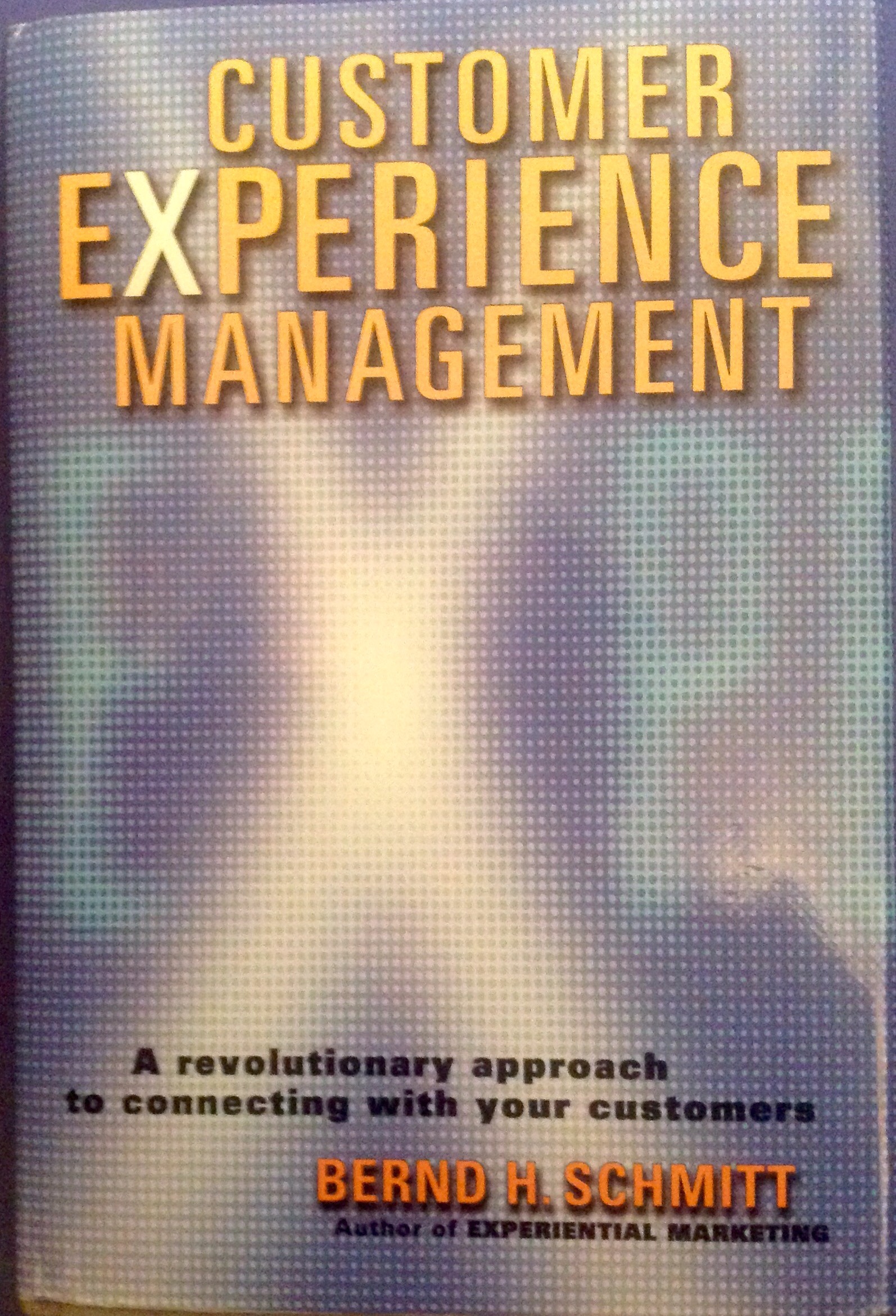
This book was literally the least expensive Marketing book I ever received. They were giving them away at work. It’s even autographed. At least I think it is, the signature doesn’t look a lot like the name of the author, Bernd H. Schmitt.
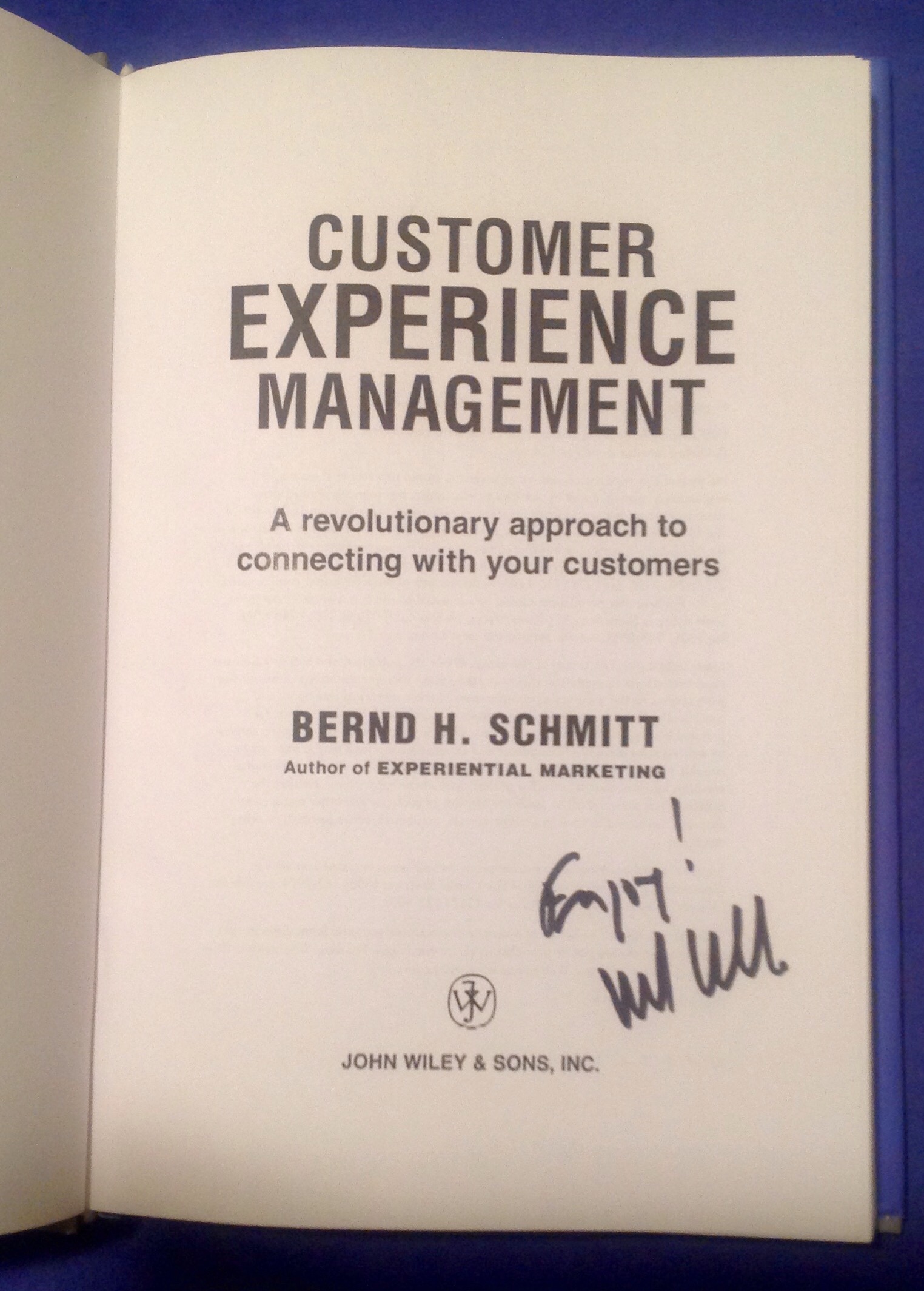
I came to the book with pretty low expectations. I mean, if it was free, then all I’m investing is my time, right?
I certainly got my money’s worth out of the book. It was worth the read. And I’m not just saying that because it was free.
The author lays out a five part Customer Experience Management (CEM) framework.
- Analyzing the experiential world of the customer
- Building the experiential platform
- Designing the brand experience
- Structuring the customer interface
- Engaging in continuous innovation
CEM is more than simply marketing to your perspective customers. Schmitt explains that it’s about adopting a customer experience-focused approach to marketing and management.
CEM is a new paradigm that represents a radical break from the old marketing and management approaches. It offers analytical and creative insight into the customer’s world, strategic tools for shaping that world, and implementation tools that companies can use to increase customer value.
And, in my mind that was part of the problem. People have been selling stuff to each other since the first monkey climbed out of the trees and set up a roadside banana stand, or since the snake sold Eve on the benefits of forbidden fruit, depending on your particular theology.
I’m always suspicious when someone designs something radical or new or tries to tell me that everything that’s known about a subject is wrong. At times “Customer Experience Management” comes across just a bit too strong on the radical meter.
Still, for anyone interested in marketing, it offers a unique perspective on both how to connect with customers and more importantly, the need to connect with customers in a way that is customer-centric.
What I Liked
Schmitt understands the subject intimately. He brings years of real world experience, with concrete examples from some of the biggest companies in business. Whether you completely adopt the CEM framework, his examples of troubled companies and what he did to help turn them around is very valuable. And if you do attempt to adopt the CEM framework and fail to create it completely, you will still understand your customers better and that’s a very good thing.
Schmitt’s writing style is also very engaging. For the middle portions of the book, where he’s laying out the details of the CEM Framework, his prose flows easily and I enjoyed it very much.
What I Didn’t
It’s the beginning and the ending where his style becomes grating. Chapter 1 “Taking the Customer Seriously — Finally” not only explains why it’s important to pay attentiont to your customers, it also devotes several pages to “Three Misguided Approaches: The Marketing Concept, Customer Satisfication and CRM.” Schmitt seems to feel the need to destroy any belief in existing marketing frameworks before laying out his unique framework. It comes across like a class on the works of Picasso that spends the first class period explain how terrible Rembrant and Delocroix were. I kept hearing that line from Macbeth, “Methinks the lady doth protest too much.”
The production value was also disappointing. The book has several photographs to illustrate various advertising and marketing campaigns. The picture quality was terrible. It was especially surprising given the over high production value of the rest of the book.
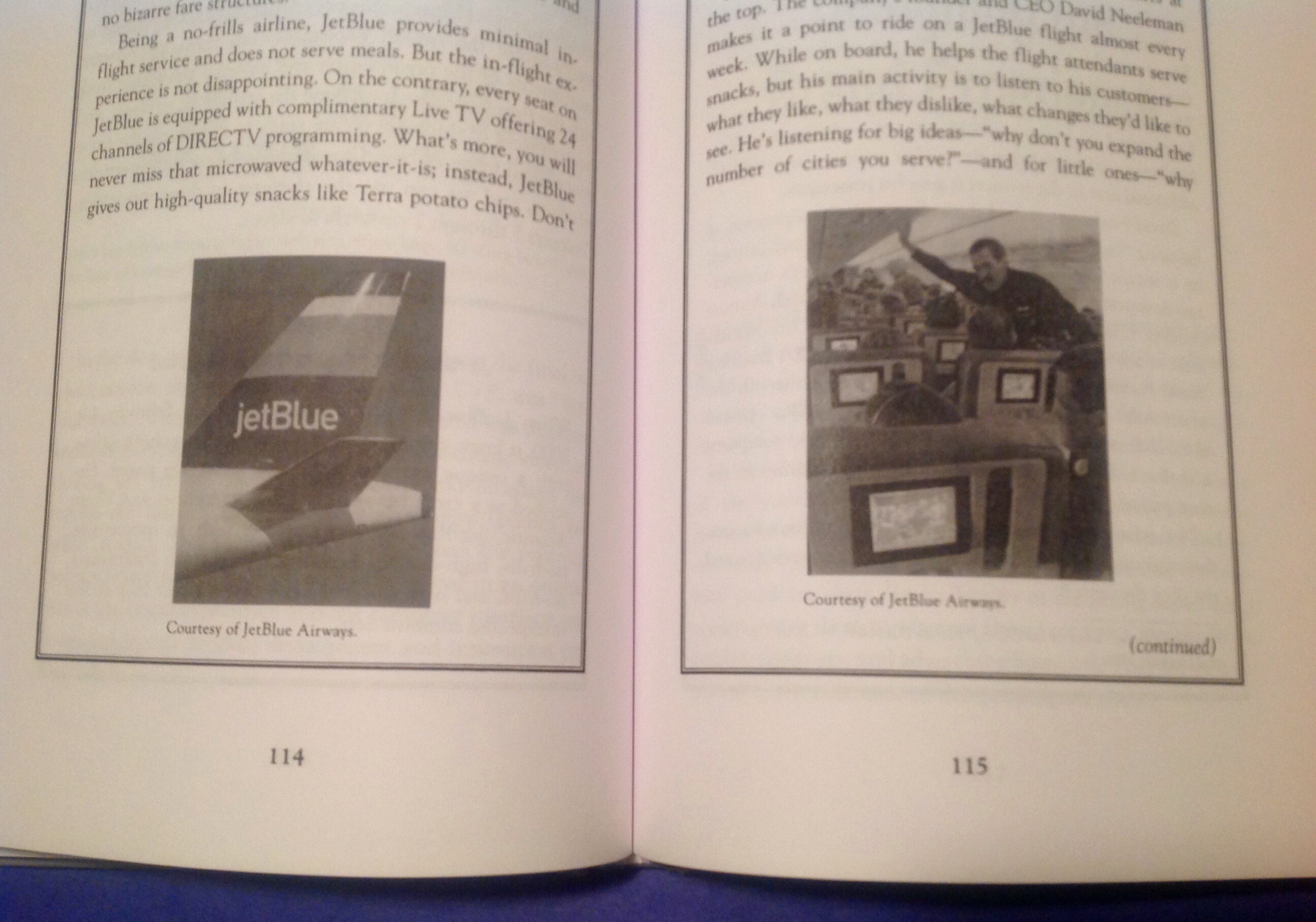
The photos might be courtesy of JetBlue, but I’m guessing they looked a lot better when JetBlue first provided them.
As a writer, you never want to remind the reader that they are reading a book. You want to suck them into your narrative and let them forget that it’s just words on a page. Schmitt’s prose was good enough to do that most of the time, but every time he introduced a photgraph, I was startled out of the narrative. Some of these photos were of professional ad materials. But, no one would be tempted to buy Nike shoes, or fly on JetBlue airlines based on these poor quality reproductions.
What It Means To You
If you are in marketing and constantly attempting to expand your vision, “Customer Experience Management” can certainly give you a fresh perspective on many of the underlying needs that mareketers and advertisers need to address. At 229 pages, it’s not going to be too much of a time commitment. However, if you are looking at how to jump start your company’s marketing efforts, you’d be better served going with an author who doesn’t think that modern marketing is misguided.
Rating
2 stars out of 5
Rodney M Bliss is an author, columnist and IT Consultant. His blog updates every weekday at 7:00 AM Mountain Time. He lives in Pleasant Grove, UT with his lovely wife, thirteen children and grandchildren.
Follow him on
Twitter (@rodneymbliss)
Facebook (www.facebook.com/rbliss)
LinkedIn (www.LinkedIn.com/in/rbliss)
or email him at rbliss at msn dot com
(c) 2015 Rodney M Bliss, all rights reserved

